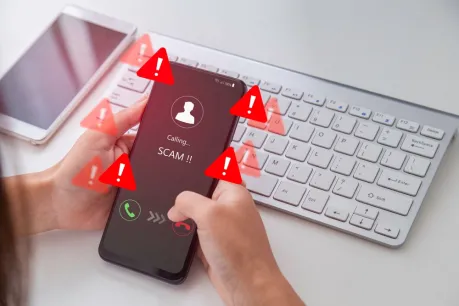Impersonation Fraud: One Phone Call Can Drain Your Life

Injured?
Just one unexpected call or text can be all it takes for a scammer to steal your bank account, identity, and peace of mind.
Impersonation fraud, also known as “vishing” or voice phishing, involves criminals pretending to be someone you trust, like a police officer, bank representative, or tech support agent, to convince you to hand over sensitive data or remote access to your devices.
How the Scam Works
To con you into giving away sensitive information, scammers will go to great lengths to convince you of their legitimacy through:
Caller ID Spoofing
Scammers manipulate caller IDs to display legitimate organizations, such as your bank or local authorities.
Urgent Scare Tactics
The script often involves alarming alerts, like “your account is compromised,” “you’re facing arrest,” or “your Social Security is suspended.”
Phishing for Sensitive Info
They may ask for passwords, OTPs, bank account numbers, or instruct you to install remote-access software under false pretenses.
SIM Swap Add-On
Once they’ve captured enough data, scammers can request your telecom provider to switch your number, giving them control of OTPs and other one-time codes.
Why the Scam Works
The high-pressure urgency of these calls and messages leaves victims feeling time-pressured and unable to think critically and clearly. With prompts to act right away, unsuspecting victims can act hastily without realizing the risks.
Caller ID spoofing doesn’t make it any easier to spot a fraud, with the falsified IDs appearing legitimate.
How to Spot the Scam
Impersonation fraud often comes wrapped in a sense of urgency. If you receive an unexpected call or text claiming your account is compromised or that you're facing arrest, take a step back first.
Legitimate banks and government agencies don’t operate this way. A major red flag is being asked to provide passwords, one-time passcodes (OTPs), or to install remote-access software. No reputable institution will ever request this information over the phone or through a text message.
Another telltale sign is the threat of severe consequences, like arrest, frozen accounts, or legal action, unless you act immediately. Scammers use fear to short-circuit your judgment. Even if the caller ID says it's your bank or a government agency, don’t be fooled. Caller ID spoofing makes it easy for scammers to fake these details.
Finally, if the communication includes a suspicious link or attachment, don’t click it. Always go directly to the official website or call a verified number to check whether there’s really an issue with your account.
5 Rules to Stay Safe
- Don’t answer unknown callers. Let voicemail screen them.
- Never provide codes or login details by phone. If someone asks, hang up.
- Always call back using other verified numbers (e.g., printed on your bank card).
- Ignore suspicious links in texts or emails. Go straight to the official website.
- Periodically check your credit reports and enable fraud alerts with major bureaus.
What to Do if You Think You’re Victimized
If you’re hit by a scam, act fast—every second counts in reclaiming your losses.
Contact your bank immediately. They may freeze accounts or reverse transactions. Next, file a police report with details like dates, times, and any screenshots. Then, place fraud alerts on your credit files and consider a credit freeze.
Finally, if you suspect that scammers gained access to your personal information due to a data breach or another form of corporate negligence, you may have legal options. Many fraudsters aren’t just guessing; they’re using stolen data from companies that failed to protect it. If your information was exposed because of poor security practices, you could be entitled to compensation.
At Morgan & Morgan, we believe companies should be held accountable when their carelessness puts your privacy at risk. Contact Morgan & Morgan today for a free case evaluation to find out more.

We've got your back
Injured?
Not sure what to do next?
We'll guide you through everything you need to know.
